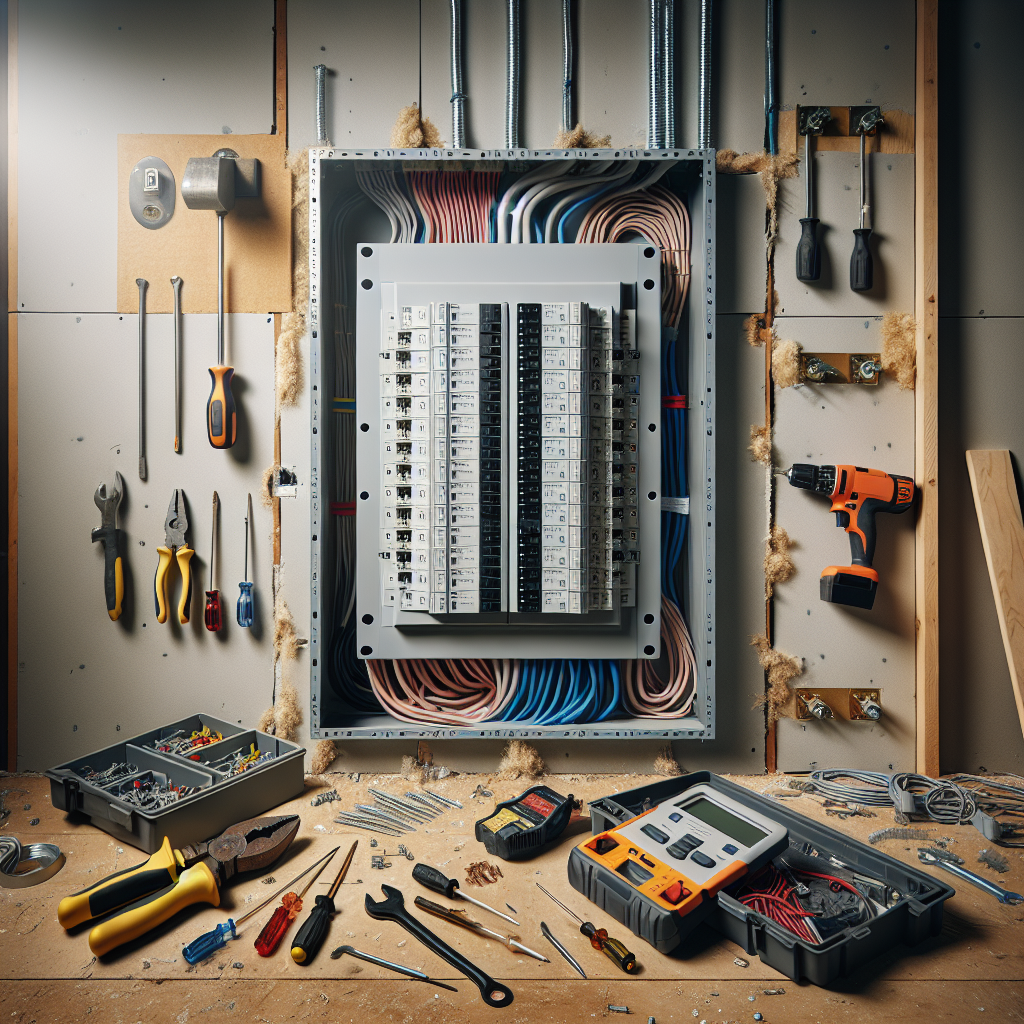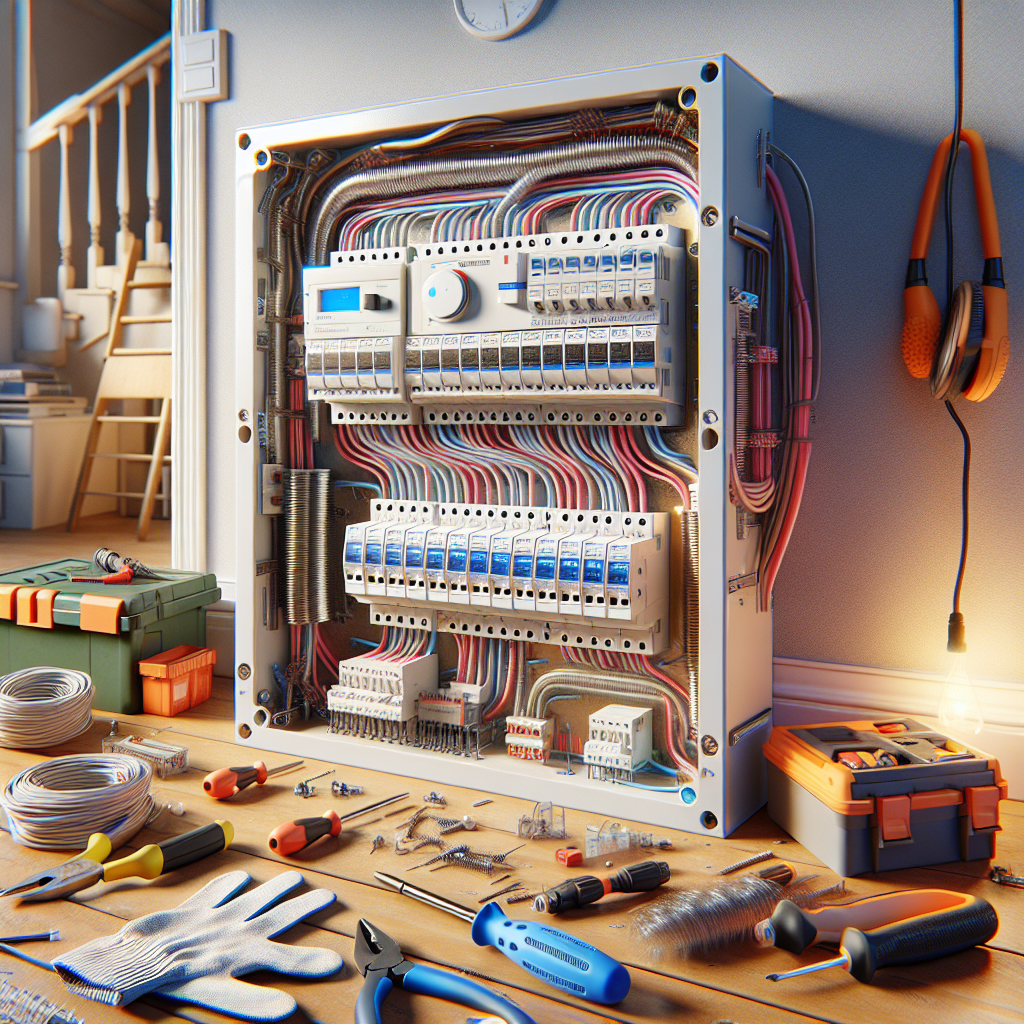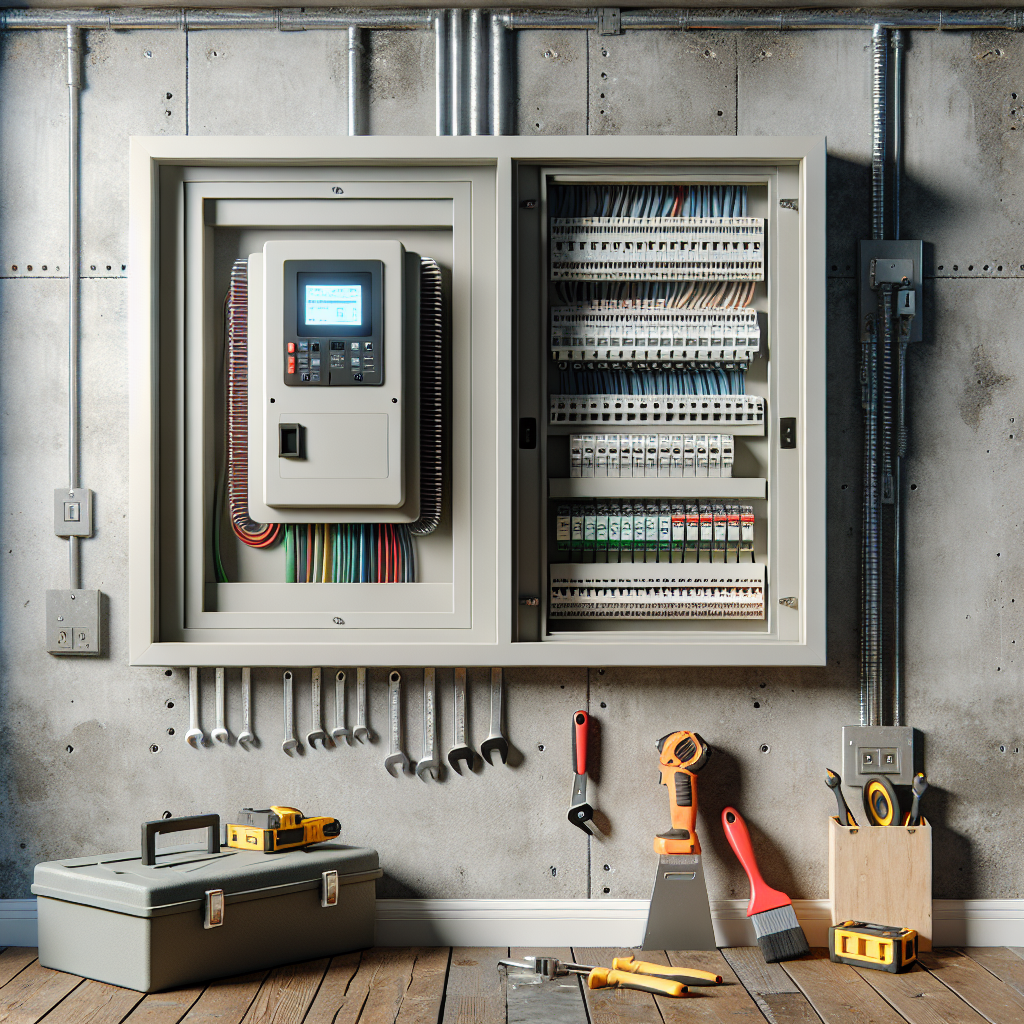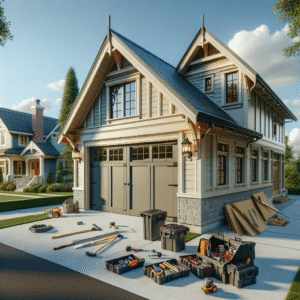Understanding Your Home’s Electrical Panel: Importance and Indicators for an Upgrade
At the heart of your home’s electrical system is the electrical panel, a critical component that distributes electricity to various circuits. It’s essential to ensure that your electrical panel is up-to-date and functioning efficiently to handle your home’s energy demands safely. In this article, we’ll explore why keeping your electrical panel in top condition is crucial and how to identify when it’s time for an upgrade.
What Does an Electrical Panel Do?
Your home’s electrical panel, often called a breaker box, serves as the central hub where the incoming electricity is distributed to different circuits. It provides a safety mechanism through circuit breakers to protect your home from overloads and potential fires.
Signs That You Might Need an Upgrade
- Frequent tripping of breakers: This could indicate that your current panel can no longer handle the load.
- Use of multiple power strips: If you find yourself relying heavily on power strips, it’s a sign your panel might be inadequate.
- Aged or outdated equipment: Panels older than 25 years may need an upgrade to support modern appliances.
Benefits of Keeping Your Electrical Panel Up-to-Date
Upgrading your electrical panel enhances safety, accommodates new appliances, and can even increase your home’s resale value. It also reduces the risk of electrical fires and provides peace of mind with a more reliable power supply.
Choosing the Right Electrical Panel: Types and Considerations for Homeowners
Choosing the right electrical panel involves understanding different types, features, and other important considerations like safety and capacity. Awareness of your home’s current and future electrical needs is crucial in making an informed decision.
Different Types of Electrical Panels and Their Features
From main breaker panels to sub-panels, each type serves different purposes and offers specific features suitable for various needs.
Factors to Consider When Choosing a New Panel
- Safety: Opt for panels that provide enhanced safety features.
- Capacity: Ensure the panel you choose can handle your home’s electrical load.
- Brand: Consider reputable brands known for quality and reliability.
Assessing Your Current and Future Electrical Needs
Analyze your typical power usage and think about future additions like home automation or an electric vehicle charger that might increase your power demand.
The Upgrade Process: Step-by-Step Guide and Safety Tips
Upgrading an electrical panel is a significant task that involves several steps and requires strict adherence to safety protocols. Whether you decide to DIY or hire a professional, understanding the process can help ensure a smooth upgrade.
Overview of the Steps Involved in Upgrading an Electrical Panel
The process typically includes removing the old panel, installing a new one, and reconnecting all circuits. It might also involve updating wiring and improving the grounding system.
Safety Precautions to Take During an Upgrade
- Power off: Ensure all power is off before starting any work.
- Use proper tools: Employ tools that are insulated and designed for electrical work.
- Wear protective gear: Always wear gloves and eye protection.
When to Hire a Professional Electrician vs. DIY Possibilities
While some aspects of electrical work can be done by a skilled homeowner, an electrical panel upgrade typically requires professional skills and knowledge of local codes and regulations. Hiring a licensed electrician is recommended to ensure safety and compliance.

If you’re ready to take your home improvement or construction project to the next level, we can help! Find trusted contractors on BuildNet, whether you’re looking for renovations, new builds, electrical work, plumbing, or anything in between. Our directory connects you with qualified professionals who can make your vision a reality.
Understanding Your Home’s Electrical Panel: Importance and Indicators for an Upgrade
What Does an Electrical Panel Do?
Think of your home’s electrical panel as the heart of your electrical system. This crucial component, often found in the basement or garage, distributes electricity from the utility company into various circuits that power different areas and devices of your home. It safeguards your abode from power surges, prevents circuit overloads, and acts as the main hub for electrical flow. Keeping this system in top shape ensures that everything from your morning coffee maker to your home office equipment runs smoothly and safely.
Signs That You Might Need an Upgrade
Is your electrical panel keeping up with the demands of modern appliances and gadgets? Here are key indicators that it might be time for an upgrade:
- Frequent Circuit Breaker Trips: This could be a sign that your current system is overloaded and unable to handle the electricity demand of your household.
- Use of Multiple Power Strips: If you find yourself relying on power strips and extension cords, it’s a signal that you may not have enough outlets, which can often be resolved with an upgrade.
- Outdated Panel: If your home still has a fuse box or a panel older than 25 years, upgrading to a modern circuit breaker system is not only safer but also a requirement in many cases for insurance.
- Adding Major Appliances or Renovation: Installing appliances like air conditioners or heaters or adding new rooms typically requires more power, demanding a panel upgrade.
- Burning Smell or Odd Noises: These are critical signs of potential electrical hazards in your old panel, which need immediate attention.
Benefits of Keeping Your Electrical Panel Up-to-Date
While the safety aspect is a significant benefit, updating your electrical panel comes with several other advantages:
- Increased Safety: New panels reduce the risk of fire and electrical mishaps by efficiently managing electrical loads and preventing overloading and short circuits.
- Better Power Distribution: Enjoy smoother operation of appliances and less interference between devices, reducing wear and tear.
- Raised Property Value: An updated electrical system can increase your home’s market value, an important consideration if you plan on selling in the future.
- Peace of Mind: With a modern electrical panel, you’ll have fewer worries about the safety and efficiency of your home’s electrical system.
Upgrading your home’s electrical panel may seem like a daunting task, but the safety and efficiency it provides make it an essential consideration for any homeowner. Whether you’re experiencing signs of an inadequate panel or simply looking to improve your home’s safety and functionality, an upgrade can be a wise investment.

Choosing the Right Electrical Panel: Types and Considerations for Homeowners
Hey there! If you’re diving into the world of home improvement, knowing about your home’s electrical panel is as crucial as picking the right paint color for your living room. Why? Because the electrical panel is the heart of your home’s electrical system, managing and distributing electrical power throughout your property. So, whether you’re renovating or simply ensuring your home is up to code, let’s walk through the types of electrical panels and what to consider when choosing one.
Different Types of Electrical Panels and Their Features
Understanding the different types of electrical panels is like knowing the difference between a sedan and an SUV—they’re both vehicles, but they serve different purposes. Here are the main types you’ll encounter:
- Main Breaker Panel: This is the most common type. It provides a main breaker to control all the circuits, acting as a primary gateway for power and safety mechanism.
- Main Lug Panel: Instead of a main breaker, these panels connect directly to the meter. These are typically used as sub-panels that are connected to the main breaker panel.
- Subpanel: Speaking of, a subpanel works off a main panel but allows for better circuit management and easier access in large homes or in areas like workshops or garages.
- Fuse Box: Older homes might still have these. They use fuses instead of breakers and are generally considered less convenient and safe than modern breaker panels.
Each type offers unique features, such as ease of installation, safety upgrades like arc fault circuit interrupters (AFCIs), and ground fault circuit interrupters (GFCIs). Depending on the age and setup of your home, one might be more appropriate than the other.
Factors to Consider When Choosing a New Panel
When picking your electrical panel, there are several key aspects to consider that will ensure you choose wisely:
- Safety: This should be your top priority. Look for panels that offer modern safety features like AFCIs and GFCIs. These technologies help prevent electrical fires and shocks.
- Capacity: Evaluate your current and future power needs. Are you planning to add a home theater? More air conditioning units, perhaps? Make sure the panel can handle the load without frequent tripping.
- Brand: Choose manufacturers with solid reputations for quality and durability. Brands like Siemens, Square D, and Eaton are often recommended by professionals.
Considering these factors will not only ensure your panel is safe but also that it’s equipped to handle your household’s electrical demands both now and in the future.
How to Assess Your Current and Future Electrical Needs
Let’s talk about assessing your electrical needs. This process isn’t just about counting the number of appliances you currently have; it’s about anticipating your future lifestyle changes and how they will impact your electrical system. Here are a few tips:
- Check Your Appliances: Sum up the wattage used by all the appliances you plan to run simultaneously. This ensures that your new panel can handle the peak load.
- Consider Home Improvements: Plan any future home renovations or additions? What about electric vehicle chargers or solar panels? Factor these into your calculations.
- Consult a Professional: It might be wise to consult with a licensed electrician. They can provide insights based on your home’s layout, existing wiring, and local regulations.
By understanding both your present and potential electrical usage, you can choose a panel that won’t just suffice for today but will continue to serve you efficiently as your needs grow.
Wrapping it Up
Choosing the right electrical panel might not be the most exhilarating part of home improvement, but it’s undeniably crucial. A well-chosen panel ensures safety, efficiency, and preparedness for future upgrades. Keep these tips in mind, and you’ll be well on your way to making an informed decision that keeps your lights on and your gadgets running smoothly for years to come. Here’s to a well-powered home!
The Upgrade Process: Step-by-Step Guide and Safety Tips
Upgrading your home’s electrical panel isn’t just about enhancing electrical system efficiency; it’s a critical step towards ensuring safety and accommodating modern electrical loads. Whether you’re installing new appliances or renovating your home, a panel upgrade might be essential. Let’s walk through the essential steps and safety measures to consider during this process, ensuring you can handle this smoothly or know when to call in the pros.
Step-by-Step Guide to Upgrading Your Electrical Panel
1. Assess Your Current Electrical Needs
Before diving into an upgrade, evaluate your current electrical demands. Are your lights flickering? Do breakers frequently trip? These could be signs that your current panel is overloaded. Consider future needs too—if you plan to add a home office or a powerful home theater system, account for those as well.
2. Choose the Right Panel
Selecting the correct panel for your home is crucial. Panels are rated by amperage, reflecting their capacity to handle electrical load. Common home panels are typically 100, 200, or 400 amps. If you’re unsure about what size suits your needs best, consulting with a professional electrician can provide clarity and prevent issues down the road.
3. Obtain Necessary Permits
Many localities require you to have a permit before you start electrical work, including panel upgrades. This ensures that the work is inspected and meets local electrical codes and safety standards. Check with your local building department to get the right permits.
4. Prepare Your Home
Before the upgrade, power will need to be shut off at your home. It’s wise to plan for this downtime. Notify your family members about the power outage, and consider safety measures for food preservation and medical equipment that requires electricity.
5. Remove the Old Panel
This step should be handled with utmost care and ideally by a professional. Removing the old panel involves dealing with live wires and complex connections. Special tools and knowledge of electrical systems are crucial for safety.
6. Install the New Panel
Mounting the new panel, connecting the wires according to code, and ensuring everything is grounded correctly is a meticulous process. Each connection must be secure to avoid any potential electrical hazards.
7. Inspection and Testing
Once your new panel is installed, it will need to be inspected by a local building inspector. This ensures your setup complies with local codes and safety guidelines. After passing inspection, it’s time to test the panel to ensure functionality.
Safety Precautions During an Upgrade
Electrical work can be hazardous. Here are vital safety tips:
- Turn Off Power: Always ensure the main power is completely turned off at the meter during the installation. This prevents any accidental electrocution.
- Use Proper Tools: Employ insulated tools and wear rubber gloves and non-slip shoes for additional protection against electric shock.
- Clear Work Area: Keep the work area free of unnecessary tools or materials to avoid tripping or other accidents.
- Verify Connections: Double-check all connections during the installation process to ensure they are secure and correctly configured.
When to Hire a Professional Electrician
While the DIY approach might be tempting for handymen enthusiasts, upgrading an electrical panel often requires professional intervention. Here are scenarios when you should consider hiring a professional:
- Legal Requirements: Some local codes might mandate that only a licensed electrician performs the work, particularly the connections at the supply point.
- Safety Concerns: If you’re not experienced with high-voltage electrical systems, the risk of serious injury is high. This is a task where understanding the intricacies of electrical systems is crucial.
- Complex Installations: Older homes or those with customized electrical setups might need a more sophisticated approach that only seasoned professionals can provide.
Upgrading your electrical panel is a significant but manageable project that enhances your home’s safety and functionality. Whether you decide to tackle it on your own or hire a professional, understanding the process helps you gear up for what lies ahead. Remember, the goal is not just to power up but to power up safely and efficiently!

What is the function of an electrical panel in my home?
An electrical panel, often referred to as a breaker box, is the main point of distribution for electrical circuits in your home. It safely divides the electrical power feed into subsidiary circuits while providing a protective fuse or circuit breaker for each circuit in a common enclosure. Essentially, it’s the heart of your home’s electrical system, ensuring everything runs smoothly and safely.
How do I know if I need to upgrade my electrical panel?
There are several signs that indicate a need for an upgrade:
- Frequent tripping: If your circuit breakers frequently trip, it might be a sign that your panel can no longer handle your home’s electrical load.
- Over 25 years old: Older panels may not comply with current safety standards and are likely unable to support modern electrical demands.
- Use of multiple extension cords: Excessive reliance on extension cords can indicate insufficient outlets, which a new panel can address.
- Addition of new appliances: Adding major appliances or a home renovation often requires an upgrade to support the increased power needs.
What are the benefits of updating my electrical panel?
Keeping your electrical panel up-to-date ensures safety, improves your home’s electrical capacity, and enhances overall efficiency. It also increases the value of your home and helps avoid potential electrical hazards.
What types of electrical panels are available?
There are several types of panels to consider:
- Main Breaker Panel: Provides a master cutoff, allowing you to turn off the electricity supply to your entire home.
- Main Lug Panel: Connects directly to the meter without a main circuit breaker. It’s primarily used as a distribution panel.
- Sub Panel: Secondary panel that can be used to add circuits. No main breaker is included; it’s fed from the main panel.
What should I consider when choosing a new electrical panel?
When selecting a new panel, consider the following:
- Safety Features: Look for panels that offer advanced safety features, such as arc fault circuit interrupters (AFCIs).
- Capacity: Choose a panel that can handle more capacity than you currently need to accommodate future electrical demands.
- Brand: Opt for reputable brands known for reliability and durability.
Also, evaluate your current and future electrical needs by assessing the number of appliances you use and plan to use.
What are the steps involved in upgrading an electrical panel?
Upgrading an electrical panel generally involves:
- Assessing your current electrical needs and future demands.
- Choosing the right panel that meets local codes and your requirements.
- Removing the old panel and installing the new one, which includes rewiring and reattaching existing circuits.
- Testing the installation to ensure everything works properly and safely.
What safety precautions should I take when upgrading my electrical panel?
Safety is paramount:
- Always turn off the main power before starting.
- Wear protective gear, such as gloves and goggles.
- Use insulated tools to prevent any accidental shocks.
- If you’re not experienced, it’s wise to avoid DIY and call a professional.
Should I hire a professional electrician to upgrade my electrical panel?
While some homeowners have the skills to handle an electrical panel upgrade, it is generally recommended to hire a licensed electrician. This ensures the job is done safely and in compliance with local electrical codes and standards. Professional installation can also help avoid potential hazards and expensive mistakes.
Conclusion
Upgrading your home’s electrical panel is a crucial investment in both your property’s functionality and safety. Given the complexity and the high stakes involved concerning electrical safety, hiring a professional for such tasks is typically the best route. Remember, the right panel not only supports your current electrical needs but also anticipates future upgrades.
If you’re considering an upgrade or need more information, contact a contractor on the BuildNet website for a free quote. With expert advice and professional services readily available, ensuring your home’s electrical system is robust and reliable has never been easier!







